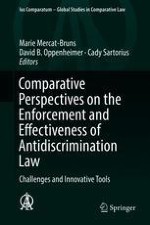2018 | OriginalPaper | Buchkapitel
India
verfasst von : Maithili Pai, Nupur Raut
Erschienen in: Comparative Perspectives on the Enforcement and Effectiveness of Antidiscrimination Law
Aktivieren Sie unsere intelligente Suche, um passende Fachinhalte oder Patente zu finden.
Wählen Sie Textabschnitte aus um mit Künstlicher Intelligenz passenden Patente zu finden. powered by
Markieren Sie Textabschnitte, um KI-gestützt weitere passende Inhalte zu finden. powered by
